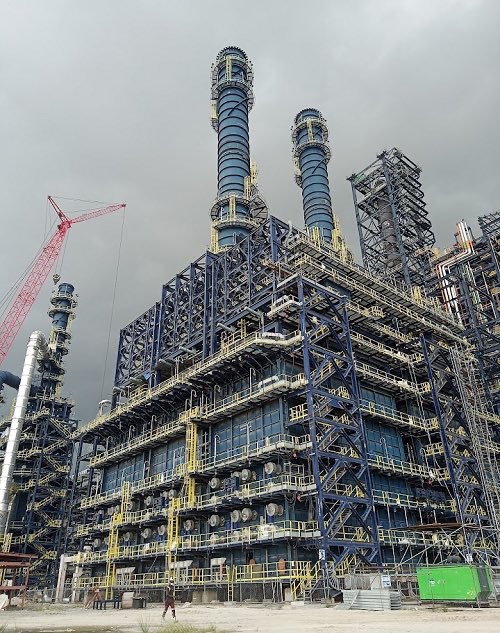
BREAKING: Dangote Refinery Accuses DAPPMAN of Seeking ₦1.5 Trillion Subsidy in Depot Price Alignment Battle

The simmering tensions within Nigeria’s downstream oil sector took a dramatic turn on Wednesday as Dangote Petroleum Refinery, Africa’s largest privately-owned crude processing facility, openly accused the Depot and Petroleum Products Marketers Association of Nigeria (DAPPMAN) of seeking an annual subsidy amounting to over ₦1.5 trillion to ensure their depot prices align with the refinery’s gantry rates. The revelation has set off heated debates within the industry, raising questions about pricing, profit margins, and the delicate balance of Nigeria’s petroleum supply chain at a time when the country is still grappling with the aftershocks of subsidy removal.
According to a statement issued by the Dangote Refinery management, the company alleged that DAPPMAN, which controls a significant portion of petroleum product distribution across Nigeria, is attempting to strong-arm regulators and stakeholders into creating a framework that would essentially guarantee them subsidies under the guise of aligning depot rates with gantry prices. Gantry pricing, a term referring to the rate at which products are loaded directly from the refinery’s gantries, has been a subject of contention since Dangote began rolling out refined products into the market. With the refinery expected to reshape the dynamics of petroleum pricing in Nigeria and across West Africa, the stakes could not be higher.
The Dangote Refinery insists that its pricing model is transparent, based on international best practices, and designed to ensure fairness for end-users while still allowing marketers to make a reasonable profit. “What DAPPMAN is asking for is nothing short of an indirect subsidy that will put undue pressure on the Nigerian economy, transferring private profit into public liability,” a senior official of the refinery was quoted as saying. “If you quantify the demand, it comes to over ₦1.5 trillion annually, which is equivalent to reintroducing subsidies through the backdoor at a time when the government and Nigerians are struggling to recover from decades of waste caused by subsidy regimes.”
DAPPMAN, however, has not remained silent in the face of these accusations. Insiders within the association argue that the issue is not as straightforward as Dangote presents it. According to sources, the depot owners face enormous operational costs, ranging from high bank interest rates and foreign exchange volatility to logistics and infrastructural deficits that drive up their expenses. They maintain that aligning depot prices with gantry rates without considering these additional costs could drive many of them out of business, thereby creating a monopoly where only the Dangote Refinery dictates pricing for the entire Nigerian market. “What Dangote calls subsidy is in reality a demand for fairness,” one depot operator said under condition of anonymity. “We cannot buy from the refinery and sell at the same price to the public without factoring in the overheads that make distribution possible in the first place. If government fails to intervene, the market will collapse, and only one player will remain standing.”
The federal government finds itself once again caught in the crossfire of Nigeria’s perennial oil industry disputes. Barely a year after President Bola Ahmed Tinubu announced the long-awaited removal of fuel subsidies, Nigerians are still battling high pump prices and inflationary pressures that have eroded disposable income. The fear that another subsidy demand, this time disguised as depot alignment, could creep into the system is sparking strong reactions among policymakers and citizens alike. Critics argue that Nigeria cannot afford to repeat the mistakes of the past where trillions of naira were spent annually propping up petroleum marketers at the expense of critical infrastructure and social welfare projects.
Industry analysts say the dispute between Dangote and DAPPMAN highlights deeper structural issues that have plagued Nigeria’s downstream petroleum sector for decades. For years, Nigeria relied on importing refined petroleum products despite being one of the world’s largest crude oil producers, with successive governments justifying subsidy spending as a necessary evil to keep fuel affordable. With the coming onstream of the Dangote Refinery, expectations were high that local refining would bring relief to consumers and reduce reliance on imports. But as this latest controversy shows, the complexities of distribution, pricing, and regulation remain formidable hurdles.
On the streets of Lagos, Abuja, Port Harcourt, and Kano, ordinary Nigerians are watching the dispute with weary skepticism. Many recall the promises that fuel prices would drop once Dangote began refining locally, yet prices have remained stubbornly high, hovering above ₦600 per litre in many parts of the country. The suggestion that marketers are now demanding ₦1.5 trillion to align depot prices has further deepened frustrations among citizens already stretched thin by economic hardship. “They said subsidy was gone, but what is this we are hearing again? Another ₦1.5 trillion? That money could build hospitals, schools, and roads. Why must everything in Nigeria be about oil and subsidy?” asked a commuter in Abuja who said he now spends half his income on transportation.
Beyond the politics and public anger, experts are warning of the dangers of creating an uneven playing field in the downstream sector. If DAPPMAN’s demands are met, it could lock Nigeria into another cycle of subsidy spending, defeating the reforms that were supposed to free up resources for development. On the other hand, if the government sides entirely with Dangote without addressing the legitimate operational costs of depot owners, smaller players may be squeezed out, paving the way for monopoly fears to become reality. “The government must tread carefully here,” said energy policy consultant Dr. Bamidele Akinwale. “What is at stake is not just ₦1.5 trillion but the future of Nigeria’s downstream sector. We need a solution that balances the interests of producers, distributors, and consumers without returning to the dark days of subsidy.”
Meanwhile, international observers are also paying close attention to developments in Nigeria’s oil sector. The Dangote Refinery, with its 650,000 barrels per day capacity, is touted as a game-changer for Africa’s energy landscape. Its success or failure could influence investments in other mega-projects across the continent. The ongoing clash with DAPPMAN therefore carries implications far beyond Nigeria, potentially affecting regional energy trade and pricing structures.
As the debate rages, the Nigerian people remain the ones bearing the brunt of these industrial tussles. Every delay in reaching a resolution translates to uncertainty in fuel pricing and availability. Transport unions are already threatening to hike fares further if pump prices increase, while businesses warn of another round of inflation that could cripple already fragile household incomes. The government has not yet issued an official statement on the matter, but pressure is mounting for swift intervention before the situation spirals out of control.
For now, Dangote Refinery maintains its stance that it will not bend to demands it considers economically destructive. The refinery insists it is committed to operating transparently and delivering value to Nigerians. DAPPMAN, however, continues to push for what it calls a level playing field, arguing that no single refinery should dictate the rules of the game. The next few weeks will be crucial in determining how this standoff is resolved and whether Nigeria can finally chart a new course for its petroleum sector or whether history will repeat itself with subsidies—whether direct or indirect—once again dominating the nation’s economic headlines.


